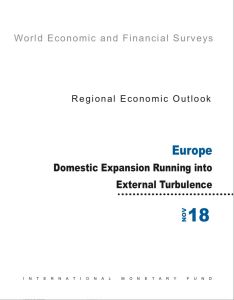Join getAbstract to access the summary!

Join getAbstract to access the summary!
International Monetary Fund
Europe
Domestic Expansion Running into External Turbulence
IMF, 2018
What's inside?
In 2018, the rate of Europe’s economic growth began to retreat, and 2019 promises more of the same.
Recommendation
The pace of growth in Europe’s advanced economies decelerated in 2018, a trend expected to continue into 2019, according to this detailed IMF analysis intended for economists and policy experts. A more hostile trade environment, the prospect of a failed Brexit deal, costlier energy, more volatile emerging markets and slowing global demand are some of the headwinds the region is battling. Against this backdrop of lower but still solid economic activity, the IMF advises that the time is right for officials to take measures to shore up their economic defenses.
Summary
About the Author
The International Monetary Fund advises member nations on policy issues and works to promote economic stability and well-being.


































Comment on this summary